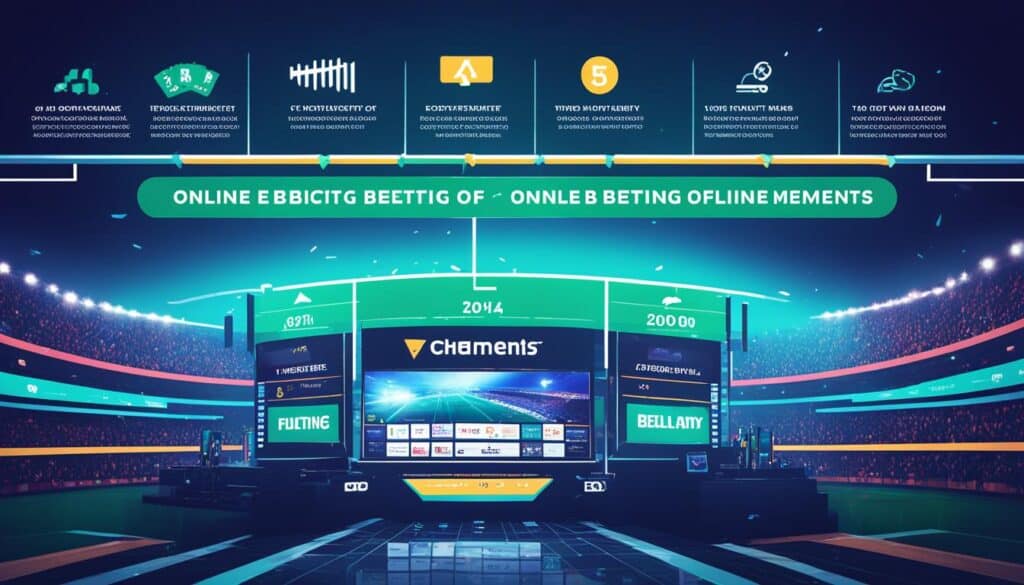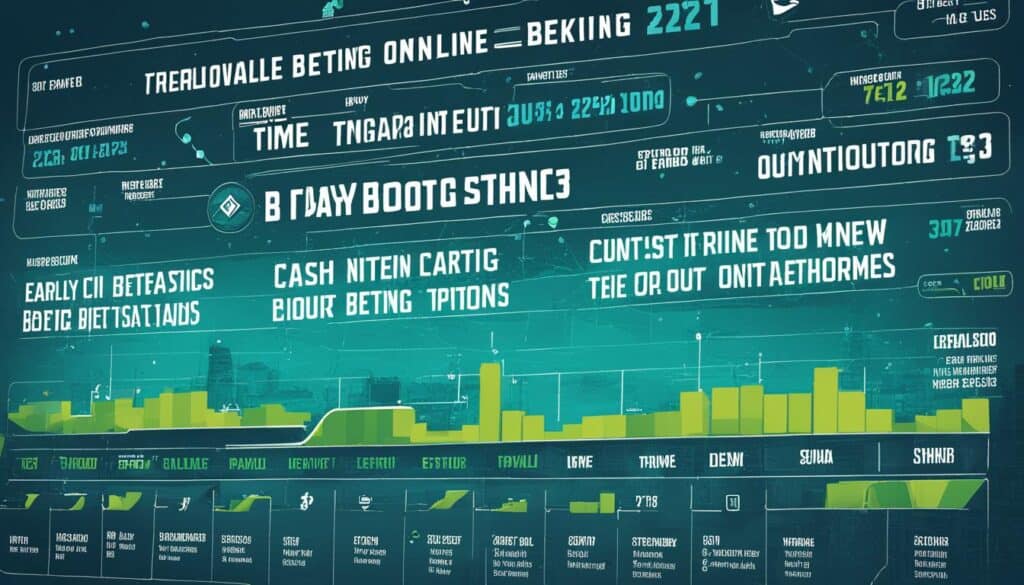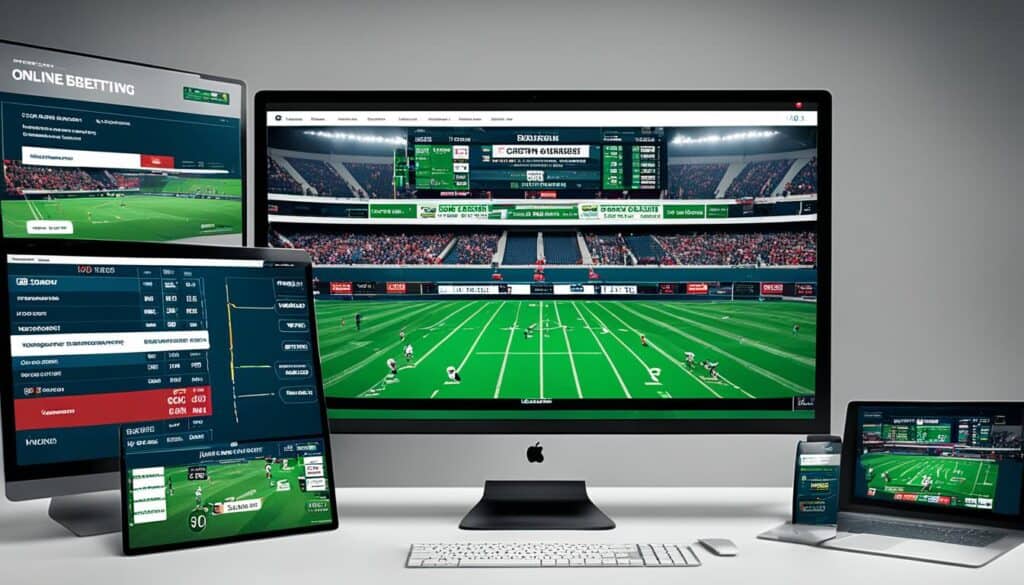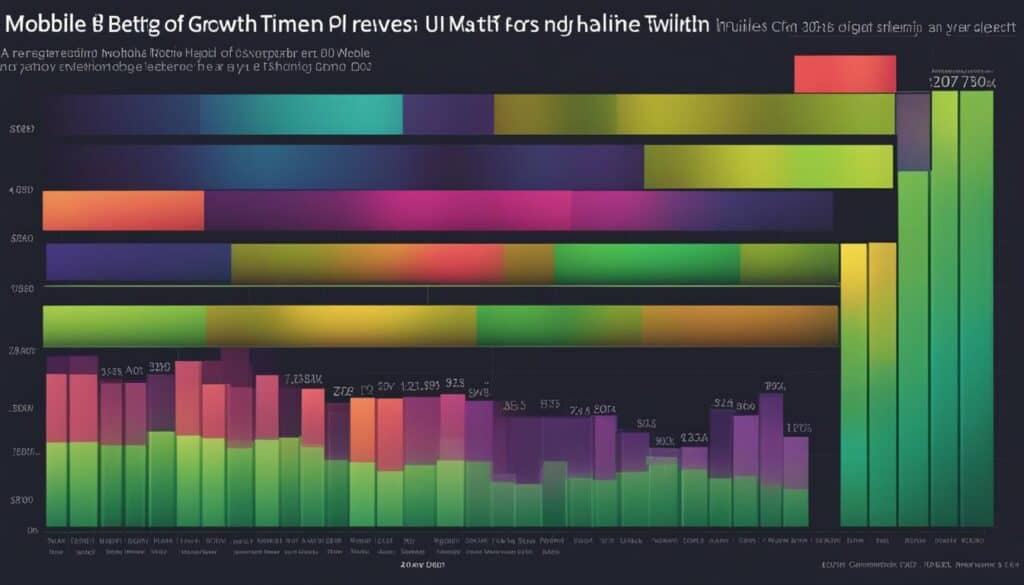The history of internet gambling is entwined with the rapid advancement of technology and the intrinsic human desire for the thrill of a wager. Tracing the online gambling history back to its inception, we witness the critical juncture in 1994 when the Free Trade and Processing Act catalyzed the birth of an industry. This legislation established the legal bedrock that allowed the nascent concept of internet casinos to flourish, heralding a new era in gaming and entertainment. The evolution of online betting has since transcended boundaries, creating a global phenomenon that redefined leisure and laid the framework for an astounding digital future.
The Roots of Internet Gambling

The landscape of gambling underwent a revolutionary change with the advent of the internet, but it took legislative innovation to lay the groundwork for what has now become an online juggernaut. The history of online gambling is marked by both legislative milestones and technological achievements that have shaped the face of digital wagering forever.
Birth of Online Casinos with the Free Trade & Processing Act
The year 1994 stands prominent in the history of online gambling, as Antigua and Barbuda passed the Free Trade and Processing Act. This act provided the legal framework necessary for the industry to thrive, giving companies the ability to apply for licenses to operate online casinos. The significance of this act cannot be overstated—it represented the first brick laid in the foundation of a thriving global online betting industry.
Microgaming and Cryptologic: Pioneers of Digital Wagering
Two companies, in particular, seized the opportunity created by these new regulations to become pioneers in the field. Microgaming is credited with creating the first operational online casino, The Gaming Club, forging the path for the future of internet casinos. In tandem, Cryptologic developed the essential software for secure financial transactions, ensuring users could bet with peace of mind regarding their money’s security. These companies not only contributed significant milestones in online betting but set standards that have endured through time.
- The Free Trade & Processing Act establishes legal online gambling.
- Microgaming launches the first successful online casino platform.
- Cryptologic introduces secure transaction technology, revolutionizing digital betting.
The history of online gambling is a tale of innovation and regulatory breakthroughs, where each company’s contribution has been a stepping stone to the industry’s expansive development. As we delve deeper into this history, we recognize the collective efforts that laid the groundwork for what would become a multi-billion-dollar industry.
Tracking the First Online Gambling Sites

As the dawn of the digital era brought profound transformations across numerous industries, the gambling sector experienced a revolutionary change with the emergence of the first online casinos. This period marked a significant shift, signaling the start of what would become a radical movement in the way individuals engage with betting activities.
The Launch of The Gaming Club and Intercasino
Two pioneering platforms, The Gaming Club and InterCasino, played instrumental roles in carving the path for what is now an enormous online betting landscape. These internet gambling sites broke new ground by offering players unprecedented access to a world of entertainment previously confined to brick-and-mortar casinos, thus setting a new standard in gaming convenience and user experience.
The Surge from 15 to 200 Websites in the Late ’90s
The explosive surge in the number of online casinos is a testament to the burgeoning popularity of internet gambling sites during the late 1990s. A growth from a mere 15 websites to over 200 within a span of a year underscored an unmistakable consumer demand and a rapidly maturing market ready to embrace the digital gambling revolution.
- Integration of secure payment systems that facilitated smooth and trusted transactions between players and platforms.
- Delivery of realistic and engaging online gaming experiences that mirrored the allure of traditional, physical casinos.
- A diversification of games offered, including variations of classic casino games and innovative new ones designed specifically for the online milieu.
The relentless innovation in this arena has continued to shape online betting trends, with online casinos constantly upgrading their offerings to match consumer expectations and technological capabilities. Today, Internet gambling sites are considered fundamental to the industry, representing a blend of modern convenience and timeless appeal.
The Evolution of Online Betting Platforms

The landscape of digital wagering has undergone a significant transformation since its inception. Where once the clink of coins and the whirl of slot machines dominated the sensory experiences of casino-goers, the realm of online casinos has digitalized these traditional forms of entertainment. This pivotal shift to online platforms has not only revolutionized how games like poker and slots are played but has also amplified their accessibility to a global audience.
The future of digital wagering is intertwined with technological advancement, where the ease of mobile betting growth is reshaping player habits. No longer restricted by physical location or operating hours, users can now indulge in gaming experiences on their smartphones and tablets, effectively carrying a casino in their pocket.
- The digitization of classic casino games and the creation of new gaming experiences.
- Mobile technology fuelling the expansion of betting platforms into everyday life.
- Robust software developments by industry leaders like Microgaming enhancing user engagement.
With each passing year, we witness the continued maturation of online betting platforms. Companies like Cryptologic have played a fundamental role in the industry, pioneering secure financial transactions over the internet, which were crucial for the credibility and growth of early online casinos.
- Increased prominence of progressive jackpots and live dealer games online.
- Stronger focus on user experience and personalized gaming.
- The adoption of VR and AR technologies to emulate immersive casino environments.
As we gaze upon the horizon of the online betting ecosystem, one fact remains clear: the symbiotic relationship between technological innovation and user convenience will continue to propel the industry to new heights. The future of digital wagering, with its roots now deeply integrated into the digital age, is set to redefine what it means to bet, play, and experience the thrill of casinos.
The Inception of Online Sports Betting

The arena of online sports betting embarked on a remarkable journey of innovation and transformation that forever altered the landscape of digital wagering. While the concept of sports betting has been around for centuries, the advent of the internet heralded a new era where placing a bet became as simple as a click of a button.
The Transition from TeleText to Online Interfaces
In the early 1990s, before the widespread availability of the internet, TeleText pages offered the public live updates and sports odds, making information more accessible than ever before. Yet, it was the emergence of online interfaces which truly revolutionized the experience of the sports bettor, ushering in a new level of convenience and engagement in sports betting. This seamless shift from analog to digital opened the door for interactive betting experiences and paved the way for the expansive market we are familiar with today.
Intertops: The First Online Sports Bet
In 1996, a monumental milestone was reached with the placement of the very first online sports bet through Intertops on an FA Cup soccer match. This historic event marked the official birth of the online sports betting industry, setting a precedent for the countless digital wagering platforms that would follow. The courage and innovation of Intertops catalyzed an industry-wide race to develop more sophisticated, user-friendly betting platforms that cater to the ever-growing expectations of the market.
Today, the online sports betting industry has become synonymous with the cutting-edge digital wagering platforms that offer live betting, comprehensive sports coverage, and dynamic odds. The origins of this bustling sector, grounded in the foundational achievements of the past, continue to inform and inspire the ongoing evolution of online sports betting experiences around the globe.
Regulating the Online Betting Landscape

As the digital age ushered in an unprecedented expansion of online betting platforms, the necessity for regulating internet gambling rapidly became apparent. With countless players engaging in digital wagering globally, the integrity of online betting operations needed to be meticulously overseen to maintain a fair and secure ecosystem. This prompted the formation of regulatory authorities like the Kahnawake Gaming Commission, instituted with the purpose of licensing and supervising internet gambling services, thus ushering in a new era of online betting laws.
Effective regulations have become the cornerstone of trustworthy online gambling environments, ensuring that each virtual casino or sportsbook adheres to international legal and ethical standards. Players now have peace of mind, knowing that there are systems in place to protect their rights and facilitate fair play. Here are the primary functions that these regulatory bodies perform to foster a reliable online betting industry:
- Granting licenses to legitimate online gambling operators
- Monitoring of all licensed platforms for compliance with the law
- Ensuring the protection of players’ data and funds
- Arbitrating disputes between players and operators
- Preventing fraudulent activities and ensuring game fairness
- Promoting responsible gambling practices
In the wake of increasing digital betting venues, it is paramount that a dynamic and responsive legislative framework continues to evolve. Thus, regulatory bodies are consistently revising and adapting online betting laws to mitigate risks associated with internet gambling and to cope with the sophisticated technologies that characterize the current era of digital wagering.
The progression towards more stringent regulations reflects a global trend aimed at safeguarding stakeholders within the online betting landscape. While the establishment of regulation has been a monumental step towards legalizing and standardizing online gambling practices, the ongoing challenge lies in balancing regulatory control with the industry’s innovative thrusts. Nonetheless, the assurance of regulation solidifies the credibility of the digital betting arena, promoting sustainable growth in the online gambling sector.
Technological Advancements in Online Gambling

The landscape of online gambling has been continuously reshaped by significant technological advancements. The breakthroughs in online betting innovation have not only streamlined the operational aspects of gambling platforms but have also intricately enhanced user experiences. By incorporating cutting-edge technologies, the industry has been able to offer seamless, secure, and more interactive gambling environments, thereby catering to the dynamic preferences of modern bettors.
One of the defining moments in the evolution of online betting came with the integration of multiplayer game platforms that debuted with Boss Media back in 1999. These developments allowed users across various geographical locations to interact and gamble in real-time, fostering a sense of community and removing the isolation associated with early iterations of online casinos.
- Implementation of Secure Socket Layer (SSL) technology to safeguard financial transactions and personal data.
- Use of Random Number Generators (RNGs) to ensure fair play and unbiased outcomes in games.
- Development of sophisticated algorithms to deliver a broader and more varied gaming experience.
- Introduction of live dealer games, combining the convenience of online betting with the authenticity of live casinos.
- Mobile technology integration, which has opened up new frontiers for on-the-go betting, a segment that continues to see tremendous growth.
Technological breakthroughs, such as augmented and virtual reality, are currently being explored for their potential to revolutionize the user experience further, promising an even more immersive and engaging gambling environment. These forward-looking developments signify an ongoing commitment within the industry to harness technological advancements in gambling and continually redefine the boundaries of online betting innovation.
Pioneering the Online Poker Industry

As the digital age advanced, the online poker industry became a significant segment within internet gambling. It was a transformative period for poker enthusiasts as the virtual realm opened up an entirely new platform for gaming. Planet Poker signaled the dawn of a new era by launching the first online platform dedicated solely to the classic game of poker. This innovative move would ultimately lead to a revolution in how poker was played and perceived worldwide.
Planet Poker: The First Virtual Poker Room
In 1998, Planet Poker emerged as the trailblazer, setting the groundwork for the burgeoning online poker industry. It offered a digital poker room where players could compete against each other from the comfort of their homes. This was a monumental leap from the traditional poker venues, placing Planet Poker as a pioneer in the market and setting the stage for future developments in internet poker trends.
The Role of Poker Tournaments in Online Betting Popularity
The establishment of competitive poker tournaments played a critical role in propelling the popularity of online betting. Platforms like PokerStars and PartyPoker advanced the industry further by hosting large-scale poker tournaments, attracting both seasoned and novice players alike. These tournaments offered not only substantial prize pools but also the thrill of competition, contributing significantly to the sustained growth and mainstream acceptance of the online poker industry.
- Introduction of online poker rooms allowed players global access to the game
- Competitive poker tournaments provided a new level of excitement and reward
- Significant platforms like PartyPoker and PokerStars drove the market forward
- The popularity of internet poker trends skyrocketed due to the accessibility and communal aspect of online environments
These developments offered a glimpse into the potential of online gaming and established the online poker industry as a cornerstone of the internet gambling community. The continuous evolution of technology, along with the strategic innovation of industry giants, ensures that the world of internet poker remains an exciting and growing field.
Key Legislation Affecting Online Betting

The landscape of online gambling is significantly influenced by stringent legislation and regulatory measures. Two pivotal laws, in particular, stand as landmarks in the history of online betting’s legal framework: The Federal Interstate Wire Act and the Unlawful Internet Gambling Enforcement Act (UIGEA). These statutes have played contrasting yet influential roles in shaping the current state of online gambling legislation in the United States.
The Federal Interstate Wire Act and Its Implications
Commonly referred to as the Federal Wire Act, this 1961 law aimed to disrupt organized crime by prohibiting certain types of betting activities. Initially designed to combat sports betting via wire communications between multiple states, its interpretation has been a subject of controversy, particularly concerning online gambling’s scope. After much debate, it was determined that the Federal Wire Act’s provisions were not applicable to online casino betting, thereby opening the gateways for various forms of online gambling not related to sports.
The Unlawful Internet Gambling Enforcement Act of 2006
The passage of the UIGEA in 2006 struck a heavy blow to the flourishing industry of online gambling. While not directly making online betting illegal, the act focused on curbing the illegal money flows linked to online betting by prohibiting financial institutions from processing transactions associated with online gambling activities. This Act had far-reaching repercussions, leading to the withdrawal of a number of online gambling sites from the U.S. market, thereby shaping the direction and operations of online gaming entities significantly.
Together, the Federal Wire Act and UIGEA have created a complex legal environment for online gambling operators and enthusiasts alike. Operators must navigate the intricate state and federal laws to remain compliant, while bettors must be aware of their local jurisprudence. The landscape continues to evolve as new legislation and reinterpretations of existing laws emerge.
Comparing Traditional vs. Online Betting

The advent of online betting has sparked a revolution in the gambling industry, setting the stage for a direct comparison with its traditional counterpart. At the heart of this evolution is convenience, which has played a pivotal role in how and why consumers choose to engage with gambling activities.
Traditional betting, with its quintessential establishments, has long provided a tangible experience where the allure was not merely the bet, but also the ambience and social interaction. Online betting, on the other hand, transformed this scenario by eliminating the need for a physical presence, thus redefining accessibility.
- Convenience: Online betting means wagering at any time, from anywhere, without the limitations of operating hours or geographical location.
- Variety: The online platform has introduced an extensive range of betting options—from sportsbooks to casino games—that traditional venues can’t match in sheer numbers.
- Betting Experience: Digital advancements have led to immersive experiences with live betting, streaming, and interactive gaming, which make the online gambling experience more dynamic.
While the charm of traditional casinos still resonates with many gamblers, the inevitable tide of the gambling industry evolution heavily leans towards online platforms. This shift is undergirded by the technological advancements that have made online betting not just an alternative but often a preferred choice. Below, we delve into specific contrasts between these two gambling modes:
- Atmosphere vs. Accessibility: Traditional betting is unrivaled in its atmospheric elements, whereas online betting is unparalleled in its ease of access.
- Social Interaction vs. Privacy: Casinos offer social elements that online platforms cannot replicate, but online betting provides privacy and the comfort of solitude if preferred.
- Immediate Payouts vs. Wide Range of Payment Options: Casino payouts can be immediate, but online platforms offer a variety of secure payment options not typically available at a physical location.
- Regulated Markets vs. Global Reach: While traditional casinos are often constrained by stricter regulations, online betting can transcend borders, offering a global marketplace.
In conclusion, when comparing traditional vs. online betting, it’s clear that the latter has not only challenged but innovatively expanded the gambling industry, allowing for growth that mirrors our increasingly digital world.
Online Betting Trends and Predictions

The landscape of online betting continues to evolve, driven by innovation and changing user preferences. forefront of this transformation are two significant trends: the surge in mobile betting applications and the explosion of interest in eSports betting. Both are indicators of a future where technology and accessibility play pivotal roles in the growth of the gambling industry.
The Rise of Mobile Betting Applications
The convenience and accessibility offered by mobile betting have catalyzed its growth, establishing it as a backbone in the world of online wagering. Users appreciate the ability to place bets from anywhere at any time, a factor that has contributed significantly to the widespread adoption of mobile betting platforms. Recognizing this trend, betting companies continue to enhance their mobile offerings, ensuring user-friendly interfaces, secure transactions, and the seamless integration of a wide range of betting options.
eSports Betting: The Emerging Frontier
eSports has rapidly ascended as a lucrative component of online betting, captivating a younger, tech-savvy audience. eSports tournaments attract viewership numbers that rival traditional sports, and betting platforms have responded by providing comprehensive coverage and betting options for these competitive gaming events. This segment of betting is poised for further growth as it capitalizes on the booming popularity of eSports and the integration of live streaming and in-play betting.
- Increased investment in mobile betting technology
- Greater emphasis on in-app user experience
- Expansion of betting markets within eSports
- Strategic partnerships between betting platforms and eSports leagues
The Future of Digital Wagering

The landscape of digital wagering is on the cusp of transformative growth, with numerous factors contributing to its dynamic evolution. Innovations in technology and a wave of new legislation are setting the stage for the future of online betting. With the market for sports betting alone projected to increase substantially, industry trend watchers are turning their attention to key areas poised to shape the next generation of digital wagering.
Legislative changes, particularly in the United States, signal a positive outlook for the industry. Recent moves towards the legalization of sports betting in several states reveal the potential for market expansion and increased consumer adoption. This trend, along with technological advancements, paints a promising picture for online betting developments. Stakeholders are keenly observing these shifts, understanding that they are fundamental to tapping into new customer bases and revenue streams.
eSports, once a niche market, has burgeoned into a significant component of online betting, owing to its immense popularity and competitive structure. As this burgeoning field continues to grow, it is expected to become an even more integral part of the digital wagering ecosystem. This aligns with the anticipated trend, suggested by market analysis, that the global sports betting market will persist in its upward trajectory over the coming decade.
- Expansion of legal online sports betting across various U.S. states
- Technological enhancements facilitating more secure and immersive betting experiences
- The dramatic rise in eSports betting popularity, ushering in new types of wagers and markets
- Industry adaption to changing consumer preferences and digital consumption habits
- Forecasted growth of the global sports betting market, advancing steadily through the next decade
As digital wagering moves boldly into the future, it is crucial for stakeholders to navigate these developments with strategic vision and innovation. The online betting landscape, ever-evolving, requires a keen willingness to adapt and lead in a market ripe with opportunities and advancements.
Adaptation and Innovation in Online Betting Systems

The online betting industry has consistently demonstrated remarkable adaptability and ceaseless innovation, particularly in the realm of gambling technology. Two of the pinnacle areas where these attributes are luminous are the adaptation of betting systems and the spearheading of innovative gambling experiences. As restrictions within jurisdictions become more complex, the industry has evolved to create secure and legal platforms for a global audience.
Navigating the tightly regulated landscape, developers have ingeniously devised dual currency platforms, especially prominent in sweepstakes online casinos. These platforms have revolutionized the way users interact with online gambling, ensuring compliance with local laws while still providing engaging gaming experiences. Here are some key points illustrating the industry’s movements toward innovative adaptation:
- The introduction of ‘play-for-fun’ currencies alongside ‘real money’ options to comply with gaming regulations in various jurisdictions.
- Adoption of blockchain technology to increase transparency and enhance security in financial transactions related to betting.
- Utilization of big data analytics to personalize the gambling experience, ensuring a tailored approach for each user.
- Development of sophisticated algorithms that adapt to individual player behaviors, potentially reducing problem gambling risks.
- Innovative live betting features that allow real-time wagering, bringing players closer to the action than ever before.
The swift adoption of these technologies showcases an industry that is not only reactive but also proactive in understanding and foreseeing consumer demands and regulatory requirements. As the digital landscape continues to evolve, so too does the world of online betting, always pushing the envelope to deliver the next wave of innovative gambling solutions.
Online Casinos and the Global Market

The domain of online casinos exhibits an impressive worldwide presence, transcending the confines of regional gambling legislation to serve a diverse global audience. As the tendrils of the global online betting market extend across borders, these digital gaming platforms confront a tapestry of legal frameworks, requiring astute navigation through the complex legalities to which they are subjected. This expansion has been facilitated not only by the industry’s agility in adapting to varied regulations but also by the strategic use of tax havens—a practice that has become a cornerstone of online gambling’s economic model.
Global Reach and Legal Complexity
Online casinos have unmistakably become an integral part of the global online betting market, delivering gaming experiences to users in countless countries. This international reach, however, is not without its intricacies. Operators must adeptly maneuver through a labyrinth of international laws that range from strict prohibitions to grey areas and full-fledged legal acceptances. The challenge lies in complying with international, federal, and local laws, which may change from one jurisdiction to another, often necessitating a fluid business model capable of adjusting to various legal climates.
The Role of Tax Havens in Online Betting Industry
Complementing the geographic expansion of online casinos is the strategic operational decision to base operations in tax havens—jurisdictions offering favorable tax and privacy benefits. Regions like Malta, Isle of Man, and Gibraltar have emerged as hubs for online gambling companies, not only due to their tax-friendly policies but also for their regulatory frameworks that are tailored to the intricacies of internet gaming. These locales enable companies to optimize profits and streamline operations while providing the legal fortitude to engage with the global market effectively and competitively.
- Malta’s robust licensing regime has made it a premier destination for online gaming businesses.
- Gibraltar offers a seasoned regulatory body that is well-versed in the online casino industry.
- The Isle of Man provides a balance of stringent regulations with incentives for gambling operators.
The convergence of the industry’s ambition for broad market engagement with the attractive conditions offered by these tax havens underscores a symbiotic relationship. This relationship is essential for sustaining the market’s vitality and is a key element in the strategic growth of online casinos within the global betting ecosystem.
Addressing the Challenges in Online Betting

The realm of online betting, while offering convenience and an extensive range of options for consumers, also presents significant challenges that industry players and regulatory bodies must navigate. Ensuring the integrity of operations and protecting consumer interests are at the forefront of this ever-evolving landscape.
Responsibilities of Regulatory Bodies
Regulatory authorities play a pivotal role in shaping the trustworthiness and legal framework of the online betting industry. Their responsibilities extend beyond just framing the rules; they must actively enforce these regulations to safeguard bettors from potential fraudulence and exploitation. This proactive approach is crucial in keeping pace with the technological advancements that characterize the sector.
- Updating and implementing gambling regulation to reflect current online betting dynamics
- Monitoring online gambling platforms for compliance with legal standards
- Facilitating responsible gambling practices among consumers
- Providing resources for dispute resolution and consumer grievances
Security Measures and Fairness in Online Gambling
Online betting sites shoulder a substantial responsibility to ensure high security and fairness in their operations. Incorporating state-of-the-art online gambling security systems and regularly auditing their games for fairness are just the starting points for these platforms.
- Implementing cutting-edge encryption technology to protect user data and transactions
- Engaging independent auditors to verify game fairness and payout rates
- Ensuring random number generators in games are operating to industry standards
- Developing robust policies to prevent and address fraudulent activities
Growth and Milestones in Online Betting
Tracing the history of internet gambling unveils a striking narrative of growth in online betting, which has burgeoned into a formidable $40 billion global phenomenon. The industry has risen from its infancy as a peripheral web-based hobby to a mainstream commercial titan, exhibiting an astounding rate of expansion and innovation. Notably, key milestones in this journey have been shaped by the dawn of cutting-edge technologies and the diversification of gambling modalities, which together, have revolutionized the digital betting scape.
The digital age has solidified the role of cryptocurrency, setting in stone a significant online gambling milestone with far-reaching implications for economic transactions and privacy within the sector. This fusion of tech and gaming has opened the floodgates to an era where bettors engage seamlessly in borderless wagering activities, shielded by the anonymity that digital currencies afford. Likewise, the sheer spectrum of gambling forms now available – from virtual slots to eSport betting arenas – reflects an industry in a constant state of flux, agilely navigating and shaping consumer preferences.
Moreover, the strategic deployment of online betting operations across various tax havens highlights the sector’s acumen in leveraging multi-jurisdictional advantages. These maneuvers not only boost the economic efficiencies for operators but also underscore the intricate global weave of legislation and business savvy that propel the industry forward. As online betting entities tap into these fertile grounds for growth, they simultaneously confront the challenge of maintaining regulatory compliance and ethical standards – a tightrope walk emblematic of the industry’s ongoing evolution.
 Online Gaming Circuit
Online Gaming Circuit




